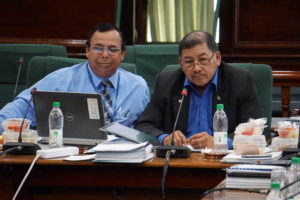Government has been heavily criticised over its handling of the Amerindian Land Titling Project (ALT) with members of the Opposition arguing that very little progress has been made so far.
Their arguments were confirmed by statements made by Indigenous Peoples’ Affairs Minister Sydney Allicock during a Parliamentary Committee meeting on Natural Resources on Wednesday.
Allicock also revealed that not only was 26 per cent of the project completed, but in three years, the Ministry has not managed to issue a single title to any Amerindian community.
“I have not been able to title any village, because we want to do things that are truly reflected in the Free Prior and Informed (FPIC) process,” the Vice President told the media.
The Minister told the Committee that the ALT work programme, which started in 2013, will require another decade before it could be completed, although the project life comes to an end in October 2018.

According to him, only about 25 per cent of the total US$10 million earmarked for the project has been utilised thus far – some G$500 million or US$2.5 million.
He explained that funding was not the constraint, but claimed that the project was faced with manpower issues, as there is need for an anthropologist, and equipment also to support it. “Several communities are targeted for demarcation and work is continuing,” Allicock asserted despite members of the Opposition calling for the Minister to provide greater explanation on the matter.
Allicock also lamented the time constraints of the project given its sensitive nature. He said had the Commission of Inquiry (CoI) been in place, it would have afforded more technical resources.
In his report, Allicock also noted that the Ministry was working to complete the demarcation of an additional four communities by the end of the stated project life, which concludes in October.
The Minister also indicated that it was likely that an extension would have to be sought to allow for all unresolved Amerindian land titling. He said, “We are in discussion and we are hoping that we could have another extension. We would have to come up with some justifying facts to seek an extension.”
Meanwhile, Opposition Member of Parliament (MP) and former Amerindian Affairs Minister Pauline Sukhai argued strongly that from the information provided on the project, it seemed that the Government was dragging its feet on the issue and as such, the land titling process was now at a standstill.
She said, “The Ministry which is a partner to all the other units that have been working in support of processing, granting land and demarcating lands to Indigenous people need to be more efficient…with the pace at which they are going, they may need at least two years’ extension and millions more.”
Allicock conceded that there were a number of issues affecting progression in some communities. He was asked to submit those reasons to the Committee in writing by Committee Chair Odinga Lumumba.
Committee members were also keen to find out about progress being made specifically in Rockstone. Residents there have repeatedly raised concerns over land titling matters.
Allicock explained that the issues in the community were unique where elections recently took place, paving the way for a new Council to take office. He said “things have already been put in place” to address the land titling issue not only in Rockstone but in all Amerindian communities.
In an attempt to school the Government members on the importance of land titling and demarcation to Indigenous peoples, Sukhai said that she was convinced that the Minister and his advisers were not too clear about the issue and as such, she advised them to do some research and acquaint themselves with them. She also criticised the Ministry for not continuing the progress made under the previous Administration.
The Government in 2013 signed a US$10.7 million agreement for the implementation of the Amerindian Land Titling and Demarcation project, which concluded in 2016. However, an extension in 2017 was requested resulting in G$165 million being earmarked for the advancing of the remaining identified areas.
So far, 13 communities have applied for absolute grants for the first time. Of that number, seven have received approval and six have been demarcated. Out of 23 communities, 14 have been issued with Certificates of Title. But not one single community has so far received a title under the new Government.
The ALT project seeks to achieve three major goals: completion of land titling issues and demarcation process for all Amerindian villages that submitted requests; increased use of existing and alternative mechanisms to resolve land titling disputes and a communication strategy, including a handbook describing the process of titling, demarcation, and social economic impact of secured land tenure.
The project is being financed from the Guyana REDD+ Investment Fund (GRIF) under the People’s Progressive Party/Civic (PPP/C) Low Carbon Development Strategy (LCDS). (Samuel Sukhnandan)



